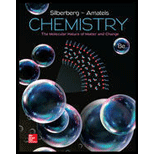
Chemistry: The Molecular Nature of Matter and Change
8th Edition
ISBN: 9781259631757
Author: Martin Silberberg Dr., Patricia Amateis Professor
Publisher: McGraw-Hill Education
expand_more
expand_more
format_list_bulleted
Concept explainers
Question
Chapter 9.4, Problem 9.4AFP
Interpretation Introduction
Interpretation:
The enthalpy of the following reaction used for the synthesis of ammonia is to be calculated.

Concept introduction:
The heat of the reaction
The formula to calculate
Or,
The bond energy of reactants is positive and the bond energy of products is negative.
Expert Solution & Answer
Want to see the full answer?
Check out a sample textbook solution
Chapter 9 Solutions
Chemistry: The Molecular Nature of Matter and Change
Ch. 9.2 - Use condensed electron configurations, partial...Ch. 9.2 - Prob. 9.1BFPCh. 9.2 - Prob. 9.2AFPCh. 9.2 - Prob. 9.2BFPCh. 9.3 - Prob. 9.3AFPCh. 9.3 - Prob. 9.3BFPCh. 9.3 - Prob. B9.1PCh. 9.3 - Prob. B9.2PCh. 9.4 - One of the most important industrial reactions is...Ch. 9.4 - Prob. 9.4BFP
Ch. 9.5 - Prob. 9.5AFPCh. 9.5 - Prob. 9.5BFPCh. 9 - Prob. 9.1PCh. 9 - Prob. 9.2PCh. 9 - What is the relationship between the tendency of a...Ch. 9 - Prob. 9.4PCh. 9 - Prob. 9.5PCh. 9 - State the type of bonding—ionic, covalent, or...Ch. 9 - State the type of bonding—ionic, covalent, or...Ch. 9 - State the type of bonding—ionic, covalent, or...Ch. 9 - Prob. 9.9PCh. 9 - Prob. 9.10PCh. 9 - Prob. 9.11PCh. 9 - Prob. 9.12PCh. 9 - Prob. 9.13PCh. 9 - Give the group number and condensed electron...Ch. 9 - Give the group number and condensed electron...Ch. 9 - Prob. 9.16PCh. 9 - Prob. 9.17PCh. 9 - Prob. 9.18PCh. 9 - Prob. 9.19PCh. 9 - Prob. 9.20PCh. 9 - Prob. 9.21PCh. 9 - Prob. 9.22PCh. 9 - Prob. 9.23PCh. 9 - Prob. 9.24PCh. 9 - Prob. 9.25PCh. 9 - For each pair, choose the compound with the larger...Ch. 9 - Prob. 9.27PCh. 9 - For each pair, choose the compound with the...Ch. 9 - Prob. 9.29PCh. 9 - Use the following to calculate of NaCl:
Compared...Ch. 9 - Use the following to calculate of MgF2:
Compared...Ch. 9 - Prob. 9.32PCh. 9 - Born-Haber cycles were used to obtain the first...Ch. 9 - Prob. 9.34PCh. 9 - Prob. 9.35PCh. 9 - Prob. 9.36PCh. 9 - How does the energy of the bond between a given...Ch. 9 - When liquid benzene (C6H6) boils, does the gas...Ch. 9 - Prob. 9.39PCh. 9 - Prob. 9.40PCh. 9 - Prob. 9.41PCh. 9 - Prob. 9.42PCh. 9 - The text points out that, for similar types of...Ch. 9 - Why is there a discrepancy between an enthalpy of...Ch. 9 - Which of the following gases would you expect to...Ch. 9 - Which of the following gases would you expect to...Ch. 9 - Use bond energies to calculate the enthalpy of...Ch. 9 - Prob. 9.48PCh. 9 - Prob. 9.49PCh. 9 - Prob. 9.50PCh. 9 - Prob. 9.51PCh. 9 - What is the general relationship between IE1 and...Ch. 9 - Is the H—O bond in water nonpolar covalent, polar...Ch. 9 - Prob. 9.54PCh. 9 - How is the partial ionic character of a bond in a...Ch. 9 - Using the periodic table only, arrange the...Ch. 9 - Prob. 9.57PCh. 9 - Prob. 9.58PCh. 9 - Prob. 9.59PCh. 9 - Prob. 9.60PCh. 9 - Use Figure 9.21 to indicate the polarity of each...Ch. 9 - Prob. 9.62PCh. 9 - Prob. 9.63PCh. 9 - Prob. 9.64PCh. 9 - Prob. 9.65PCh. 9 - Prob. 9.66PCh. 9 - Prob. 9.67PCh. 9 - Prob. 9.68PCh. 9 - Prob. 9.69PCh. 9 - Prob. 9.70PCh. 9 - Prob. 9.71PCh. 9 - Geologists have a rule of thumb: when molten rock...Ch. 9 - Prob. 9.73PCh. 9 - Use Lewis electron-dot symbols to represent the...Ch. 9 - Prob. 9.75PCh. 9 - Prob. 9.76PCh. 9 - By using photons of specific wavelengths, chemists...Ch. 9 - Prob. 9.78PCh. 9 - Prob. 9.79PCh. 9 - Prob. 9.80PCh. 9 - Prob. 9.81PCh. 9 - Prob. 9.82PCh. 9 - Prob. 9.83PCh. 9 - Find the longest wavelengths of light that can...Ch. 9 - The work function (ϕ) of a metal is the minimum...Ch. 9 - Prob. 9.86PCh. 9 - Prob. 9.87PCh. 9 - Prob. 9.88PCh. 9 - In a future hydrogen-fuel economy, the cheapest...Ch. 9 - Prob. 9.90PCh. 9 - Prob. 9.91P
Knowledge Booster
Learn more about
Need a deep-dive on the concept behind this application? Look no further. Learn more about this topic, chemistry and related others by exploring similar questions and additional content below.Recommended textbooks for you
 ChemistryChemistryISBN:9781305957404Author:Steven S. Zumdahl, Susan A. Zumdahl, Donald J. DeCostePublisher:Cengage Learning
ChemistryChemistryISBN:9781305957404Author:Steven S. Zumdahl, Susan A. Zumdahl, Donald J. DeCostePublisher:Cengage Learning ChemistryChemistryISBN:9781259911156Author:Raymond Chang Dr., Jason Overby ProfessorPublisher:McGraw-Hill Education
ChemistryChemistryISBN:9781259911156Author:Raymond Chang Dr., Jason Overby ProfessorPublisher:McGraw-Hill Education Principles of Instrumental AnalysisChemistryISBN:9781305577213Author:Douglas A. Skoog, F. James Holler, Stanley R. CrouchPublisher:Cengage Learning
Principles of Instrumental AnalysisChemistryISBN:9781305577213Author:Douglas A. Skoog, F. James Holler, Stanley R. CrouchPublisher:Cengage Learning Organic ChemistryChemistryISBN:9780078021558Author:Janice Gorzynski Smith Dr.Publisher:McGraw-Hill Education
Organic ChemistryChemistryISBN:9780078021558Author:Janice Gorzynski Smith Dr.Publisher:McGraw-Hill Education Chemistry: Principles and ReactionsChemistryISBN:9781305079373Author:William L. Masterton, Cecile N. HurleyPublisher:Cengage Learning
Chemistry: Principles and ReactionsChemistryISBN:9781305079373Author:William L. Masterton, Cecile N. HurleyPublisher:Cengage Learning Elementary Principles of Chemical Processes, Bind...ChemistryISBN:9781118431221Author:Richard M. Felder, Ronald W. Rousseau, Lisa G. BullardPublisher:WILEY
Elementary Principles of Chemical Processes, Bind...ChemistryISBN:9781118431221Author:Richard M. Felder, Ronald W. Rousseau, Lisa G. BullardPublisher:WILEY

Chemistry
Chemistry
ISBN:9781305957404
Author:Steven S. Zumdahl, Susan A. Zumdahl, Donald J. DeCoste
Publisher:Cengage Learning

Chemistry
Chemistry
ISBN:9781259911156
Author:Raymond Chang Dr., Jason Overby Professor
Publisher:McGraw-Hill Education

Principles of Instrumental Analysis
Chemistry
ISBN:9781305577213
Author:Douglas A. Skoog, F. James Holler, Stanley R. Crouch
Publisher:Cengage Learning

Organic Chemistry
Chemistry
ISBN:9780078021558
Author:Janice Gorzynski Smith Dr.
Publisher:McGraw-Hill Education

Chemistry: Principles and Reactions
Chemistry
ISBN:9781305079373
Author:William L. Masterton, Cecile N. Hurley
Publisher:Cengage Learning

Elementary Principles of Chemical Processes, Bind...
Chemistry
ISBN:9781118431221
Author:Richard M. Felder, Ronald W. Rousseau, Lisa G. Bullard
Publisher:WILEY
Calorimetry Concept, Examples and Thermochemistry | How to Pass Chemistry; Author: Melissa Maribel;https://www.youtube.com/watch?v=nSh29lUGj00;License: Standard YouTube License, CC-BY